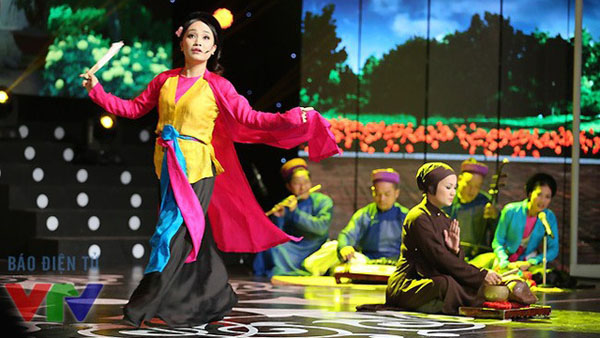


|
Meritorious Artist Nguyen Thu Huyen performing the role of Thi Mau in a classic cheo play ‘Quan am Thi Kinh’ (Photo: VTV) Question:
How have you nurtured and maintained your love for cheo over the past 25
years?
Meritorious
Artist Nguyen Thu Huyen: I think we can achieve anything if we
do it with love. Love without condition will help you gain many things, and
all of what I have today is the result of love. I love cheo unconditionally.
I
graduated in 1992 when traditional stages faced fierce competitiveness from
other art forms. Many people from my generation have quit their career in the
arts and many theatres have been closed. However, I have never fallen out of
love with Cheo because I believe that true value will always
exist in life and maintain a certain position in the hearts and minds of the
audience.
With that
love, I have exerted every effort to bring the charm of cheo to
audiences. It took me years to fulfil the role of Thi Mau, a character from a
classic cheo play Quan Am Thi Kinh (Goddess
of Mercy), . When I am in the street, people sometimes recognise
me and call me by ‘Thi Mau’ even though they don’t remember my real name. I
am so happy to see that my performance has drawn such a success.
Do
you feel that love and passion in young actors?
Yes, I
do. I have met many youngsters who have a deep passion for cheo.
I always tell them that following an arts career is a tough path, and they
must always be consistent. Unless they establish themselves as a serious cheo artist,
they will be confused about this path.
Since I
first graduated, I have always felt that the path that I should take is that
of cheo. I have also tried my best to inspire people’s interest
in and love for cheo.
Hanoi
Cheo Theatre is appreciated as an active arts unit which has successfully
overcome other competing art forms and reached the audience while many others
of its kind have failed. Can you share with us how the theatre manages to
always win the audience’s hearts and minds?
Our
theatre’s director, People’s Artist Thuy Mui is very active in developing new
initiatives which have received much appreciation from both artists and
audiences. One of our successful projects which have been carried out over
the past four years is ‘Bringing cheo to schools.’
The
project aims to reach out to the future generation of cheo lovers.
Under the project, more than 100 shows have been staged in Hanoi’s schools,
from elementary to secondary and high schools, introducing students to
classic extracts of popular cheo plays. Students have shown
much interest in our performances and in the cheo art form
in general.
Therefore,
I think instead of being passive in waiting for audiences to come to our
theatres, we should be active in engaging the audience, helping them gain a
further understand of cheo, and inspire their love for the
traditional art form.
We also
have to nurture the love for cheo and traditional art forms
in general among younger generations; otherwise we will have no audience in
the future.
It
is said that people today are indifferent to traditional art forms and cheo
in particular as such traditional practices are no longer attractive to them.
What do you think about this?
We can’t
blame the audience for their indifference. I think traditional stages, and cheo in
particular, should keep them renovated in order to meet the increasing demand
of the audience and stay in tune with the current trends of today’s life.
We can’t
always just bring to the stage the same old classical plays. However, if we
only follow people’s demands without preserving the core value and essence of cheo,
we may face the risk of losing the identity and unique characteristics of cheo.
It is a huge obstacle faced by all cheo artists.
The
Hanoi Cheo Theatre has just launched a ‘Hanoi Saturday Night’ programme,
which is held every Saturday at Dai Nam theatre. Can you share with us about
the programme?
The
two-hour programme aims to provide a stage for cheo artists
and folklore artists to show off their talents. The weekly programme features
cheo performances (both ancient and modern cheo) as well as comedy and chau
van (ritual singing) performances.
Famous
works that helped build the reputation of Hanoi’s cheo in
the past will be staged, including Quan Am Thi Kinh (Goddess
of Mercy), Ngoc Han Cong Chua (Princess Ngoc Han) and Nang
Sita (Sita).
Every
month, there will also be a performance featuring 12 acts to introduce the
practice of Mother Goddess worship, which was recognised by UNESCO as an
Intangible Cultural Heritage of Humanity last year.
We hope
that the stage will become a cultural venue for audiences, both local and
foreign, in Hanoi. As it is well-located in the centre of the city, I believe
that Dai Nam theatre will become a favourite address for traditional art
lovers.
Thank
you so much for sharing with us.
|